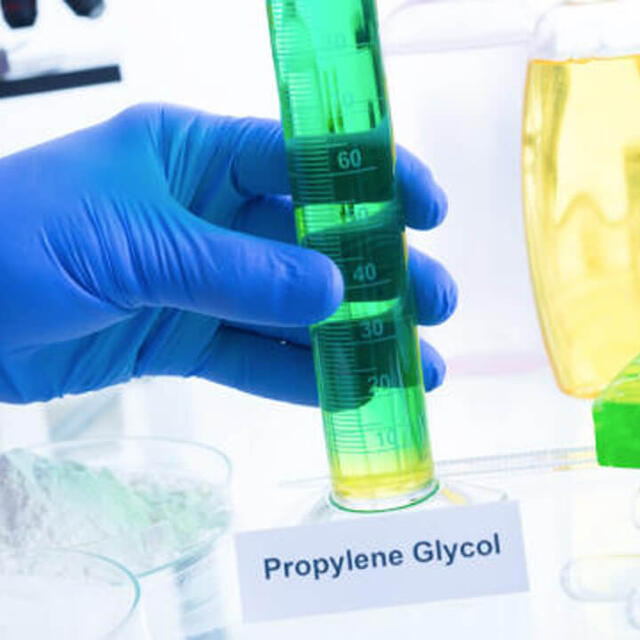
Today, in intimate life, more and more women and men are choosing safe and high-quality products for sex. Each year, new studies emerge on the effects of various ingredients in lubricants, sex toys, and massage oils on human health. Quality and safety have become the primary criteria for selection. Unfortunately, not all intimate products meet these standards. Many contain harmful chemicals that may be safe for cosmetic use but are not suitable for intimate cosmetics. This complicates the choice and confuses the buyer. When reading a label, pay attention to the ingredients in the lubricant to avoid many potential issues and protect yourself and your partner.

Glycerin (Glycerin) is linked to an increased incidence of candidiasis (thrush). This fungal infection is caused by microscopic yeast-like fungi of the Candida genus, particularly Candida albicans. If you are prone to yeast infections, avoid lubricants containing glycerin. At low concentrations, glycerin serves as a nutrient medium for fungi, while at higher concentrations, it damages the mucous membrane. Glycerin is a key factor in high osmolality. High-osmolality lubricants dehydrate and damage cells, making tissues more susceptible to infections.
Parabens (Paraben, Methylparaben, Ethylparaben, Butylparaben) – Many people nowadays try to avoid these synthetic preservatives in all products they use. Although parabens mimic estrogen in tissues, studies suggest they may contribute to an increased risk of breast cancer. Parabens can also irritate the skin and cause allergic reactions.
Petroleum-based ingredients (Mineral Oil, Liquid Paraffin, Vaseline) – These substances coat the skin, hindering its permeability and normal function. They act as a sealant, depleting natural moisture. Petroleum-based components may also contain impurities that have been linked to health issues, including cancer. Many multipurpose lubricants, such as petroleum jelly, contain these ingredients. Petroleum-based lubricants can degrade latex condoms and create an unfavorable vaginal environment, making it more vulnerable to infections.
Menthol (Menthol) – Can irritate the skin and damage the mucous membrane.
Sugar (Sugar) – Often found in flavored lubricants, it can disrupt the vagina’s natural pH balance. Sugar may contribute to fungal infections by serving as a food source for yeast bacteria.
Phenoxyethanol (Phenoxyethanol) – Classified by the Environmental Working Group as moderately hazardous. Skin irritation is a common side effect. High concentrations may harm the reproductive system, weaken the immune system, and pose risks to the nervous system in newborns. Phenoxyethanol is a chemical preservative used in perfumes, insect repellents, and as a solvent in acetate cellulose production. Avoid this ingredient.
Propylene Glycol (Propylene Glycol) – This potentially hazardous substance is banned by many natural/organic cosmetic certification systems. Like glycerin, propylene glycol contributes to high osmolality. Symptoms of its use include burning, pain, irritation, and allergic reactions. It is often found in lubricants as a solvent and preservative. Additionally, it is used in food, tobacco products, and is the main component of electronic cigarettes.
Synthetic fragrances (Fragrance, Parfum) – These are among the most irritating ingredients for the skin. They contain chemicals such as phthalates, which are known irritants and may cause allergic reactions or disrupt hormonal functions. Phthalates have been linked to reduced sperm counts in men and reproductive defects in developing male fetuses when pregnant women are exposed to them. Lab analyses of popular colognes and perfumes have revealed an average of 14 undisclosed chemicals in each product that may trigger allergic reactions or interfere with hormone function.
Alcohol (Alcohol, Ethanol) – Can cause dryness and irritation. If a woman suffers from vaginal dryness, she should avoid lubricants containing alcohol.
Chlorhexidine (Chlorhexidine) – Frequently found in lubricants, this substance can cause irritation. Chlorhexidine is primarily an antibacterial agent used in antiseptics. Frequent use can kill beneficial bacteria, disrupting the natural balance of vaginal flora and increasing the risk of infections.
Silicone (Methicone, Dimethicone, Cyclomethicone) – A synthetic compound. Silicone ingredients can interfere with the skin’s normal functions by coating it. Although silicone provides smoothness, it does not hydrate the skin. Have you noticed how silky your skin feels after applying synthetic foundations and lotions? After washing them off, your skin feels tight and dry. Silicone-based lubricants require thorough washing, as residue can disrupt the body's natural microbiome.

You may disagree with us, but we believe that the best ingredients for an intimate lubricant are those given to us by nature. For this reason, we produce lubricants using pure natural raw materials and certified organic ingredients, ensuring that your sexual experience is natural and safe. If you pay attention to the ingredients in the food and cosmetics you use, we recommend applying the same approach to your choice of lubricants. You may discover a new world of love!
For natural love!
Ingredients: Aqua, Guar Gum**, Organic Chamomile Extract*, Organic Flaxseed Extract*, Xanthan Gum**, Organic Aloe Vera Extract*, Citric Acid**, Sodium Benzoate, Potassium Sorbate.
* Organic ingredients
** Natural ingredients
Ingredients: Rapeseed Oil**, Shea Butter**, Organic Coconut Oil*, Cocoa Butter**, Vitamin E**.
* Organic ingredients
** Natural ingredients
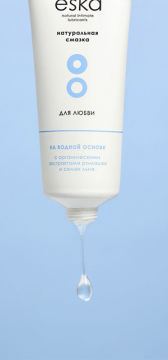 Eska - water-based lubricant, 75 ml
19,50 USD
Eska - water-based lubricant, 75 ml
19,50 USD
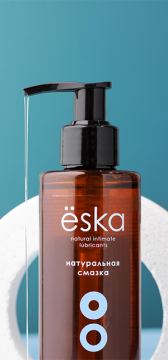 Eska - water-based lubricant, 200 ml
42,40 USD
Eska - water-based lubricant, 200 ml
42,40 USD
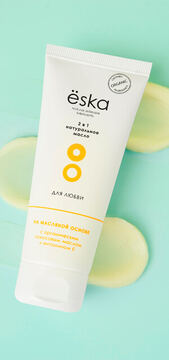 Eska - oil-based lubricant, 75 ml
23,10 USD
Eska - oil-based lubricant, 75 ml
23,10 USD
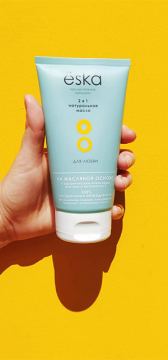 Popular
Eska - oil-based lubricant, 150 ml
38,90 USD
Popular
Eska - oil-based lubricant, 150 ml
38,90 USD
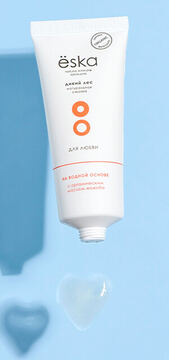 New
Eska - water-based lubricant Wild Forest, 75 ml
19,50 USD
New
Eska - water-based lubricant Wild Forest, 75 ml
19,50 USD
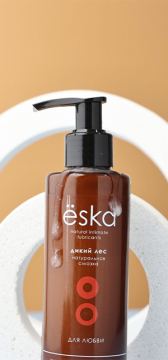 Eska - water-based lubricant Wild Forest, 200 ml
42,40 USD
Eska - water-based lubricant Wild Forest, 200 ml
42,40 USD
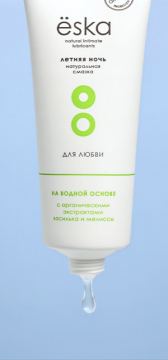 Eska - water-based lubricant Summer Night, 75 ml
19,50 USD
Eska - water-based lubricant Summer Night, 75 ml
19,50 USD
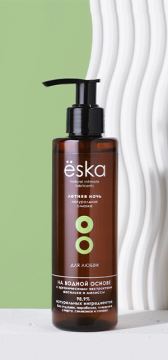 Eska - water-based lubricant Summer Night, 200 ml
42,40 USD
Eska - water-based lubricant Summer Night, 200 ml
42,40 USD
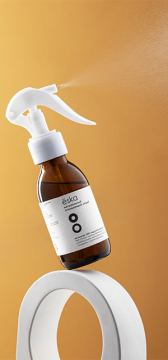 New
Eska - spray for cleaning and disinfecting sex toys
15,90 USD
New
Eska - spray for cleaning and disinfecting sex toys
15,90 USD